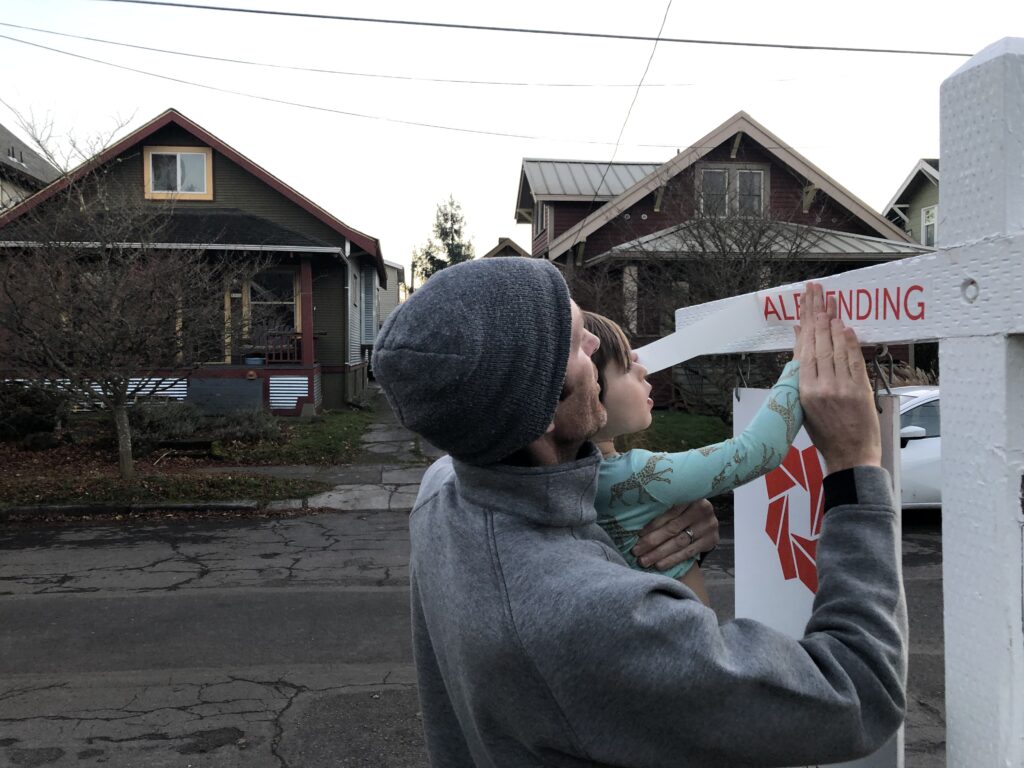In an ideal world, our homes are our source of stability, our base of operations, and the nerve center from which our lives proceed and evolve and change. So it’s not uncommon that when those life changes require a new home that better fits those changing needs, the question arises: how do I purchase a new home if I need the net proceeds from the sale of my existing home in order to purchase a new home?
That’s when a contingent offer situation comes into play. In addition to generating the funds for purchasing the new home, a contingent offer allows you to shop for a new home while still living in your house; if the timing works out, you only move once. But, and this is a big caveat, it can be a complex and time-consuming process, so it’s important to know what to expect prior to getting started.
And that’s what I just helped my clients Peter and Erin do: we navigated a very competitive segment of the NE Portland market, found a house that fit all of their future needs in terms of size, location, condition, and price, and were fortunate to have their contingent offer accepted and moved into first position. (Their offer was originally in a back-up status before the first buyers withdrew their offer.) We crafted a strategy that positioned them for success, and it was a complicated process of meeting multiple milestones with two sets of parties, and keeping everything organized and synced up.
Let’s dive into the various details of a contingent offer situation, and how to develop a winning strategy:
First of all, contingent offers are just like all other offers to purchase a home, except for the condition of your own home sale. Because of this condition, contingent offers are less attractive than most other offers. In a competitive market such as ours, it’s a big lift to ask sellers of a home to accept an offer that hinges on a home that hasn’t yet been sold or perhaps even put on the market. In Peter and Erin’s case, they were not able to put their house up for sale until they secured an accepted offer on a new home. With two young boys and a dog, and with Peter working from home, it would have been very inconvenient and expensive to sell their home first, and then look for a home – with no guarantee of a timeline for finding that new place.
Fortunately, after more than 15 months of searching, they found their ideal place and were ready to make an offer. Prior to submitting the offer, I spoke with the listing agent to explain Peter and Erin’s situation. This is something I do with all of my clients, but it was especially important here to attempt to find some stronger bond and connection between the sellers and my clients. Accepting a contingent offer in many ways is an act of deep trust, and working to ensure that trust was in place early in the process was crucial. Fortunately, the sellers shared a lot in common with Peter and Erin and their family, and remembered themselves in that same situation years ago.
Peter and Erin’s offer stated that upon acceptance of their offer, or placement into first position, they would put their home on the market within one week. That meant a lot of uncertainty if and when we would put their house on the market. I counseled them to expect about 2-3 weeks before we had greater clarity on the first position buyers. It takes about this long to work through the inspection period and subsequent negotiations, and this is often where a deal will fall apart. Indeed, about two weeks later, we got word that the buyers backed out, and Peter and Erin were moved into first position. We then had one week to get their house ready to be listed, and fortunately I had already helped them start to prep with decluttering, organizing and cleaning, and I had all of the relevant data on their house ready to go. We just needed to get photos taken, and we went live on Halloween day…auspicious, perhaps, but not spooky!
Their offer also stated that they would notify the sellers of their decision to move forward or terminate within 28 days. From my market research, we knew that 23 days on market was the average for a house like Peter and Erin’s, and I was confident that we’d find a buyer in that time period. Since the new house was also in this same market area and segment, the listing agent understood that a 28 day promise was reasonable and supported by the data. Indeed, we went pending 21 days later.
Here are the basic components of this unique contingency:
- If your home is not yet listed for sale, you must provide a date when this will happen. Obviously, the quicker, the better.
- You will then provide a deadline date by which you will accept an offer on your home.
- This is where your broker must have a solid understanding of the average days on market for similar homes to yours in your neighborhood, in order to provide a clear timeline to the sellers on how long it should be before you accept an offer on your existing home. Of course, the shorter, the better.
- If that date passes without you receiving an acceptable offer, you then have two standard choices, and one potential option:
- Remove the contingency and move forward with your purchase.
- Terminate the offer by letting that date pass without further action. If you terminate the offer in this manner, you will receive your earnest money deposit back.
- A third potential ‘option’ is that you negotiate to extend this date with the seller — this ‘option’ is not guaranteed and shouldn’t be part of your plan.
- The seller who accepts your contingent offer is still allowed to continue to market their home for sale, and even accept other offers that are more attractive than yours. Your status as a contingent buyer puts you in what’s called ‘bumpable status’, although sometimes the sellers will just leave the house in a pending status and not provide other potential buyers with the opportunity to view the home.
- If the seller does receive a better offer than your contingent one, before you’ve notified the seller that you’ve accepted an offer on your existing home, you will receive notice from the seller, and you’ll have (typically) one day to choose between one of three options:
-
- You’ve accepted an offer on your home, thereby removing your contingency;
- You have not yet accepted an offer, but you will remove the contingency of your home sale and agree to move forward with the transaction and pay for the balance of the home with other verifiable funds; or,
- Terminate the transaction and receive a refund on your earnest money deposit.
Here are a list of things to think about and discuss before choosing a contingent offer approach:
- If you’ll be living at your home while it’s on the market, you will need to keep your house in a ready-to-show state, with showings occurring with little notice, likely for a solid 3-4 weeks. Think about what this will mean for your daily life, and whether and how you can adjust to make this possible.
- Ask your broker’s opinion on days on market for your house, and how this will help/hurt your chances of a contingent offer being accepted.
- Consider the crucial importance of pricing competitively. When you have limited time to accept an offer on your home so you can buy your next home, this is not the time to set an unreasonable, unsupported or stretch listing price. The hope with a competitively-priced home in a competitive market is that you will receive multiple offers and you can ultimately get more for your house than you listed it for. In fact, we experienced this very thing: Peter and Erin received an offer over their original listing price, despite making a $10,000 price reduction after two weeks on the market.
In the end, everything came together very smoothly. It was the result of a great strategy, excellent planning, teamwork and communication, a deep reservoir of patience and fortitude by Peter and Erin, and skillful, quality agents on the other sides of both transactions.

Now, finally, Peter and Erin get to welcome a new decade with their two young boys and their beloved dog, in a new home that meets or exceeds all of their needs. It was well worth the wait, and their joy is my joy – a huge reason why I do this work.
If a contingent offer makes sense for your situation, I’m happy to discuss more details with you and to help form a strategy for your success!
Header Photo and Credit: Natalia Y on Unsplash
—
ANDY MEEKS
Living Room Realty
Licensed Oregon Broker | Earth Advantage REALTOR®
andy@livingroomre.com | 971.400.0195 | PDX
My Zillow Reviews
Your referrals are at the heart of my business,
and always greatly appreciated. Thank you.





